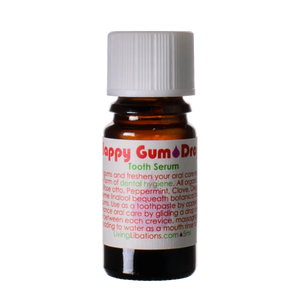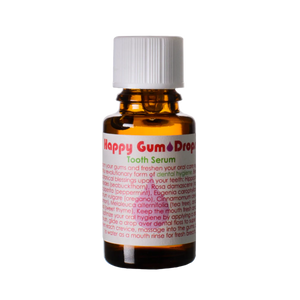Genuine essential oils address the circumstances that lead to a compromised immune system, including unwanted bacteria, viral loads, chronic inflammation, and a congested lymph system. The use of genuine essential oils originated as a medical therapy based on the pharmacological benefits of essential plant extracts. Essential oils and supercritical extracts are the key to our Living Libations formulas. They are highly concentrated, and with some of our botanicals, a whole plant is required to create only one drop of oil. The distinctive lipid-soluble structure of essential oils allows them to penetrate the lipid matrix of the gums and benefit the immune system. They send nutrients to the blood vessels and molecules, and reach the dentine, nerves, and roots of the teeth. They get the circulation and the lymph system going. Elements such as seabuckthorn berry in the Healthy Gum Drops help to regenerate gum tissue. Essential oils are also potent in oxygen radical absorption capacity, or ORAC (Oxygen Radical Absorbance Capacity), and have been found to be among some of the most powerful antioxidants. Clove and cinnamon are very high in ORAC capability, and have impressive properties for eliminating bacteria. In addition to which the mosaic effect of the combined botanicals creates an effect of thousands of plant compounds. Some plant compounds will reduce inflammation, while others will have an antibacterial effect, and others an antiseptic one. Many essential oils combine all of these compounds.
Essential oils are extremely potent, often hundreds of times stronger than the herbal extraction of the same plant. Each oil has hundreds of botanical chemical components that work synergistically. Genuine distillations of plants, flowers, seeds, roots, and trees have been used medicinally for centuries. Each one of the botanical species in these formulas is carefully selected by Nadine Artemis for their individual and synergistic effects that improve and maintain gum and oral health. The combination of antiseptic, astringent, circulatory and analgesic botanicals create optimal molecular activity.
Cinnamon, Cinnamomum ceylanicum. Our true cinnamon bark essential oil from Madagascar is antiseptic and antibacterial. It stimulates blood circulation to the gums and promotes their health and regeneration. Cinnamon is high in the compounds eugenol and cineol, both of which have potent anesthetic and antiseptic properties that increase the production of white blood cells. According to the work of Drs Franchomme and Pènoel, cinnamon bark oil is effective against 98% of all pathogenic bacteria.[1]
Clove Bud, Eugenia carophyllata, is an analgesic essential oil from the flowering buds of the clove tree with an extremely high ORAC. Clove has relieved toothaches and freshened breath since ancient times. A potent antibacterial, antiviral, and antifungal, clove boosts the immune system and stimulates blood flow with its botanical constituents of eugenol, esters, and sesquiterpenes, all of which combine to create an essence with an impressive action against pathogens and microbes. “It is antiparasitic and helps gum infections, toothaches and tonsillitis.”[2]
Oregano, Origanum vulgare, wild oregano oil from the mountains of the Mediterranean, has a bounty of botanical benefits with a broad spectrum of antibacterial, antifungal, anti-parasitic, anti-microbial, anti-viral, and anti-inflammatory action. Wild oregano contains two phenol compounds (in the following concentrations) that contribute to its medicinal applications: carvacrol at over 65% and thymol at 3.4%. These phenols possess potent antiseptic, analgesic, and antibacterial properties. Dr. Gerald Smith, DDS, explains, “Basically, oregano works like an antibiotic,” boosting the immune system. Many studies show that oregano has a broad range of antimicrobial activities and works against fungus, virus, and bacteria, including E. coli, Staphylococcus aureus, and Pseudomonas aeruglinosa. Wild oil of oregano in oral applications can also improve dental hygiene as it destroys plaque-causing bacteria and reduces risks of gum disease.
Peppermint, Mentha piperita, helps with digestion and has an analgesic and cooling anti-inflammatory effect. Ingesting peppermint oil reduces levels of oxidized fats in body tissue and reverses declines in glutathione that were caused by radiation exposure[3]. Our peppermint is a genuine distillation of the fresh leaves and comes from a fourth generation family of distillers in France. It is important to understand that the peppermint flavouring in commercial toothpaste is artificial menthol and offers no benefit in preventing gingivitis. Real peppermint is a potent anti-oxidant and inhibits the bacterium that causes tooth decay.
Rose Otto, Rosa damascena, is an elegant and precious essence. It takes sixty roses to make one drop of Rose Otto essential oil! One of the most medicinally valued extracts, it adds resiliency and elasticity to the gum tissue. It is an effective analgesic and is vulnerary, meaning that it speeds up the healing of tissues with its potent antiviral and antiseptic properties. It is great for cold sores and cankers. Rose Otto also has the ability to regenerate connective tissues and tonify the gums.
Seabuckthorn Berry, Hippophae rhamnoides, is an incredibly rich and vital oil; extracted from a berry, it is perfectly balanced in omega 3, 6, 7, and 9 oils. Our seabuckthorn berry is a special super critical extract that is able to capture over 190 bioactive substances from the edible berry. The oil is also potent in antioxidants, anti-inflammatory beta carotene, carotenoids, and phytosterols that reduces redness and helps heal mucous membranes. I have been using seabuckthorn in many of my formulas since 1994 and have found the oil regenerates cells, protects against cell water loss, and is rich in vitamins C, E, and provitamins A and B’s. Seabuckthorn Berry is rich in lipids, beneficial fatty acids, and rare palmitoleic acids. All of these extraordinary plant properties contribute to regenerate and revitalize connective and gingival tissue.
Tea Tree Oil, Malaleuca alternifolia, from the paper bark tea tree, has been used for thousands of years as a medicinal plant by the Australian Aborigines. Tea tree oil has anti-viral, anti-fungal, and anti-bacterial properties, and is “A therapeutic agent in chronic gingivitis and periodontitis, conditions that have both bacterial and inflammatory components.”[4] Tea tree is very high in natural anti-inflammatory agents and contains the plant-chemicals cineol and propanol, both kinds of natural chemicals that can decrease gingivitis and reduce plaque. Tea tree also helps stop the approach of bacteria and is very astringent and antiseptic. In a scientific dental study,[5] a genuine distillation of tea tree oil (2.5%) proved effective in the treatment of chronic of gingivitis and inflammation. High in natural anti-inflammatory, antibacterial constituents of 1.8 –cineol, terpinen-4-ol, tea tree essential oil decreased the level of gingival teeth and reduced plaque scores in the study. Furthermore, the study showed that a total of 162 oral bacteria isolates (including streptococcus) were inhibited and rapidly destroyed by tea tree oil concentrations of less than 2%. The study concluded, “The components of Tea Tree Oil are known to have lipophilic properties which facilitate its diffusion through the epithelium. If Tea Tree Oil is readily absorbed after topical application into the gingival tissues and has anti-inflammatory properties once it has entered the connective tissues, it would be a unique non-toxic agent.”[6] The Healthy Gum Drops formula contains more than 2% of this astringent and antiseptic essence.
Thyme Linalool, Thymus officinalis linalool, is a rare variety of the thyme species. It is both antiseptic and gentle. Thyme Linalool balances oral salivary secretions, stimulates the immune system, and acts as a decongestant. Overall, it is a tonifying and effective immuno-stimulant with anti-bacterial agents.
Essential oils in their unique nature are all antibacterial, antifungal, and antiviral to varying degrees. In the book Beyond Antibiotics, Michael Schmidt devotes an entire chapter to the antimicrobial efficacy of essential oils, and states, “One of the advantages essential oils have over antibiotics is that bacteria do not develop resistance to essential oils. Many essential oils exert their antibacterial effect by interfering with the bacteria’s ability to breathe. On the other hand, antibiotics interfere with the life cycle, or metabolism of, bacteria, but since bacteria are very crafty creatures, they change their chemistry and genes, which makes the antibiotic less effective the next time it is used. As a result, new generations of antibiotics will need to be developed to stay ahead of these organisms. Additionally says Schmidt, “another advantage to essential oils is that some actually stimulate immune function.”
The botanical serums created for the Successful Self-Dentistry protocol are Healthy Gum Drops and Yogi Tooth Serum. Many people have asked us, “What is the difference between the two and which should I use?” The answer is that they have the same effect and the same excellent results, yet they contain different synergies of botanicals. All the ingredients are active and all the ingredients are antibacterial, antifungal, and antiviral, meaning they can remove unwanted oral bacteria, revivify gum tissue, and enhance the immune system.
Yogi Tooth Serum and Healthy Gum Drops achieve the same results with different botanical selections. They maximize the health of one’s oral ecology by both rejuvenating the gum tissue and increasing blood circulation to the gums and blood vessels of the mouth. The Healthy Gum Drops is fresh and minty tasting. The powerful bitters of neem in Yogi Tooth Serum take some people a little getting used to (although the cinnamon and cardamom in the product do help make the neem palatable). That being said, there is no need to get both, although some choose both for variety and alternate between the two. Both serums are great for flossing, brushing, and for keeping gums healthy, which is a major key to oral health. Both formulas are also effective on a deeper level and, while they work wonders at cleaning the teeth and nourishing the gum tissue, they are also beneficial to digestion and the stomach. So, even if you are only focusing on the teeth and gums, the botanicals in these serums are part of an integrated, harmonious system that can also benefit your whole body.
People sometimes ask if it is okay if they happen to swallow any of the oral care serums. The short answer is yes, in the “drop” quantities in which they are used. Essential oils are potent and it is often advised they not be taken internally in any quantity. This is true if the oils are not a genuine authentic distillation. However, when pure distillations of essential oils are taken in small quantities (i.e. by the drop), most are fine (and often beneficial) for internal use. In fact, many essential oils are used by the food and flavor industries. Orange juice is often flavoured with essential oil from oranges, Earl Grey Tea is flavoured with essential oil distilled from bergamot, and many liqueurs, confectionaries, chocolates, and flavour extracts use various essential oils. Essential oils are lipid soluble and, because they have a small molecular size, are able to penetrate the dermal layer of the skin, positively affecting the body through the lymphatic vessels, capillaries, cells, and nerve endings located there.
What Goes on the Skin Goes In
Aside from being cautious about what and how much is ingested by swallowing, it is significant to know that everything that is applied to the body, including essential oils, or the manufactured chemicals of perfumes, toothpaste, and synthetic lotions, are also absorbed into the bloodstream, cells, and organs whenever they are applied to the skin, and often to a higher degree than by eating and digesting something. This rate of absorption is even higher inside the mouth and its moist tissues where the skin wall, or epithelium, is only one cell thick. This is especially true if one has bleeding gums where anything in the mouth will have direct access to the bloodstream. We would not want to put anything in, on, or around the body that could not be swallowed. With ingredients, discernment is important.
How these products are different than regular toothpaste and actually nourish the oral ecology:
Mouth Math: acid + bacteria = inflammation = plaque = tartar = bleeding = sensitivity = decay = receding gums = exposed dentin = decay = lower immunity for overall health. The middle of the tooth is a pulp cavity and it contains nerve endings and blood vessels. Teeth are "alive" similar to the crystalline calcium make up of coral reefs. The mouth's salvia acts like an oceanic sea of alkalinity. Acidity strips the teeth of enamel making the teeth more vulnerable to bacteria. Unhealthy bacteria are the cause gingivitis, inflammation, periodontitis and decay. Under the gum line is cementum. Cementum keeps the tooth attached to gums and jaw bone held with collagen fibers. These deeply penetrating formulas containing amazing lipophilic properties that facilitate diffusion through the epithelium nourish the cells by promoting circulation to the gum tissue, dentin and blood vessels within our teeth. “Minty fresh” is a marketing promise we all know. Common toothpaste feels refreshing because it contains synthetic mint (menthol) or other flavor by-products such as cinnamon (cinnamaldehyde). These are not the real plant essences; they are synthetic derivatives. Foaming chemicals in your mouth while you are brushing your teeth do not create optimal oral ecology. Regular toothpaste gives an illusion of freshness, yet it does not really remove plaque, it is the brushing that does that. It is best to be minimalist about it and use a dry toothbrush with a dab of salt, baking soda, or a Tooth Serum.
The chemicals used in commercial toothpaste, including many of the brands sold in health food stores, include chemicals that you do not want in your mouth, such as glycerin, which coats the teeth and blocks the saliva from doing its primary job of re-mineralizing the enamel. You will also find calcium carbonate, which is essentially chalk that is not at all good for teeth. Also, what paste would be complete without the detergent and surfactant sodium lauryl sulfate, which makes toothpaste foamy? This known carcinogen breaks down your skin's natural barrier, easily penetrates skin, causing bleeding gums, and allows other chemicals to penetrate by increasing skin permeability approximately 100-fold. Additionally, when combined with other chemicals, it transforms into carcinogenic nitrates and can reside in the body for five days.
Some toothpastes contain propylene glycol, also known as anti-freeze, which is not to be handled without gloves in a lab. Then there’s the FD&C color pigments (including coal tar derivatives that contain heavy metals and accumulate in the body), formaldehyde, Triclosan (a registered pesticide and bio-persistent chemical that destroys fragile aquatic ecosystems), artificial sweeteners, and synthetic isopropyl alcohol. You may also be surprised to learn that ethanol is the primary ingredient in most mouthwashes, even though it is known to cause approximately 36,000 cases of oral disease a year! How is it possible that carcinogens could help keep your mouth healthy? Yet when people find that they have breath or gum problems, one of the first things they do is go out and get a new brand of toothpaste and a big bottle of ethanol-based mouthwash.
Healthy gums provide a natural barrier against the 400-plus microorganisms entering the circulatory system. The epithelium (the very thin skin inside your mouth) is only one cell thick and is designed to keep toxins, bacteria, and infection from entering the body. The soft oral tissues are great at absorbing whatever comes into contact them, with approximately 90% absorption efficiency, the tiniest break or cut in the epithelium (bleeding gums) allows toxins and bacteria to enter the bloodstream quite quickly.
Many Uses:
*These concentrates (water and alcohol free) can be added to salt-water for an excellent mouthwash.
*One drop added to a dry tooth brush (good-bye toothpaste)
*One drop added to a dry toothbrush and then dipped in (aluminum-free) baking soda, or salt.
*Massaged into gums, especially areas where the pockets are low and the dentin is exposed.
*One drop to proxa-brushes, sulca-brushes and rubber-tip stimulators
*One drop on tongue-scrappers
*One drop on tongue through the day for fresh breath
*One drop gargled in water for sore throats
*One drop on cankers sores; herpes lesions
*Apply one drop several times a day to any oral wound, laceration, incision to ease pain, *reduce inflammation, keep the incision clean and generate new cells.
*One drop to your string of floss, getting the Gum drops between each and every single tooth is very effective.
Side Benefits:
*Diminished canker sores
*Eases herpes
*Boosts immune systems and sinuses
*Soothes sore throats
*Keeps toothbrush clean




